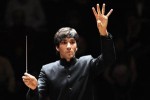Title
At 28, German conductor David Afkham is one of the fastest-rising stars of the concert podium. The winner of the Nestlé and Salzburg Festival Young Conductors awards in 2010, Afkham has been mentored by such eminent artists as Valery Gergiev and Bernard Haitink; serves as a conducting fellow of both the Los Angeles Philharmonic and the Richard Wagner Association of Bayreuth; and has led the London Symphony Orchestra, the Chicago Symphony Orchestra, and the Cleveland Orchestra. Juilliard’s orchestral season opens on October 10 with Afkham’s highly anticipated New York debut, in which he will direct performances of Brahms’s monumental Second Piano Concerto and Tchaikovsky’s beloved Fourth Symphony.
Body
Born in Freiburg, Germany, Afkham began playing piano and violin at the age of 6. Just nine years later, he entered his hometown’s University of Music, where he studied both piano and conducting. In addition, he performed regularly as a violinist alongside his brother, Micha, now a member of the Berlin Philharmonic’s viola section. Still, as David Afkham said in a recent conversation with The Journal, he felt something was missing. “I was interested in many things, not just music,” he said. “History, language, culture in general. I realized that at the piano, even in chamber music, I was somehow alone. I was looking for a professional environment where I could combine all my interests.” He knew conducting was his true calling the first time he took the podium. “It was at once pure passion,” he said. “If you have this moment, then you have to continue.”
Afkham’s array of interests always informs his interpretations. “Conducting is so much more than just beating time. There is all the preparation. Studying a score means you have to ask, ‘What does it mean? What time was it written in? Who influenced the composer?’” he said. “That’s what makes it interesting.”
Afkham is excited to present the program of Brahms and Tchaikovsky. Of the Fourth Symphony, he said, “It’s a good piece to [do] with an orchestra of younger people. It’s just beautiful to play and it’s something people can connect very fast and easily to.” Now one of the composer’s most popular works, the Fourth had a stormy conception: Tchaikovsky composed it as his emotionally disastrous marriage was failing and dedicated it to his devoted patroness Nadezhda von Meck. One of his most personal works, its fiery gestures stretch the symphonic genre to its limits, but when it premiered, under the baton of Nikolai Rubinstein in 1878, it was a serious critical failure.
Brahms is another composer who is very dear to Afkham. “In Germany, Brahms is like mother’s milk. You grow up with it,” he said. The Second Piano Concerto was premiered in 1881, just three years after the Tchaikovsky, with the composer as soloist. At more than 45 minutes in length, this work is a test not only of technique and endurance, but also of interpretive depth. Its four movements (one more than typical Classical and Romantic concertos) alternately exult, charm, unsettle, and soothe the listener. Composed just after his Second Symphony, this work shows Brahms at the height of his expressive powers.
While Afkham is enjoying his busy schedule, he is the first to admit that perspective is important. “I’m still very young and there’s so much to learn,” he said. His advice to other young conductors is also his advice to himself: “What helps is being very open-minded, trying out many things and making mistakes, and giving time to your own development. Sometimes it is important to say ‘no, this is too soon.’ Giving [yourself] time to grow is really important. Sometimes, I’m a little bit impatient and must remind myself that the path is the goal.





